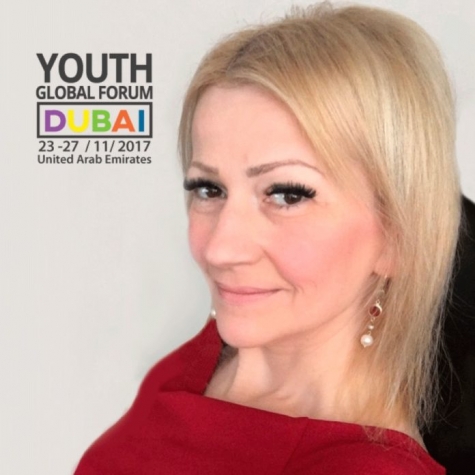With the Youth Global Forum Dubai 2017 less than one month away, Youth Time International Movement continues to interview experts who will be travelling from all over the globe to share their knowledge, ideas, and cultural experiences with participants at the event. One of these experts is Ms. Dorotea Milas, Lecturer at the Zagreb School of Business in Croatia. Ms. Milas’ research interests are in the fields of philosophy (ethics), religious science, communication and cultural studies. She has participated in national and international scientific and professional conferences and has published several scientific and professional papers. Ms. Milas will be hosting a workshop under the theme, ‘Social Factors that Influence Knowledge Development and Knowledge Management Techniques’. This pre-event interview aims to provide Youth Global Forum participants with added insight and understanding as to what they can expect from the workshop, in addition to learning how to best prepare for the event.
Ms. Milas, on behalf of the Youth Time International Movement, we are delighted to welcome you to share your expert knowledge and advice with participants at our Youth Global Forum in Dubai next month. Would you share with us a short introduction?
Before introducing myself, I would like to congratulate and thank the Youth Time International Movement for providing and enabling the organization of valuable events with the purpose of educating young people in a broad field of scientific and professional activities. I’m a professor of philosophy and religious sciences, and I obtained the title of lecturer in the field of information and communication sciences. In business and academic life, I give priority to interdisciplinarity because I believe that, with interdisciplinarity, we open many doors and can more clearly and precisely articulate what we want. I’m employed in the Zagreb School of Business in the Communications Department, in the Marketing and Communications professional study program. The Zagreb School of Business offers a wide range of study programs including: Marketing and Communications), Cultural Management and Production, and Supply Chain Management. I enjoy working with students, young people full of potential, eager for knowledge, which is my greatest motivation and inspiration to perform everything I do from the heart and with full responsibility towards them. What I do is not a job, it’s a calling. It’s a daily challenge, unrepeatable, unpredictable, and my students give me wings to fly together and to open new doors on our life journey.
Why are you interested in the Youth Global Forum and what about it excites you most?
I am thrilled with the idea of exchanging opinions, experiences and cultures. Young people have the opportunity to show their skills, abilities and creativity in creating new ideas and interconnecting through educational workshops and lectures. Youth Global Forum is combination of educational and cultural exchange programs encourages participants to become creative, innovative and responsible. In today’s world, responsibility represents a high degree of philanthropy. Programs organized by Youth Time abound in social responsibility, mutual respect, and are organized under high criteria and ethical principles. I am proud and grateful to participate in the Youth Time program and to hold a workshop for young people of open-minded and desirous new knowledge.
Without giving too much away, would you share with us a little about what your workshop on ‘Social Factors that Influence Knowledge Development and Knowledge Management Techniques’ is going to be about? Will there be any particular area of focus?
First of all, knowledge is a competitive advantage. The influence of knowledge, as an intangible resource, on the market value of an enterprise has an increasing role in society. Employee knowledge is the intellectual capital of an enterprise and a part of its intangible asset. Thanks to its social component, the basic prerequisite for knowledge sharing in the company is the motivation of employees for this process and the existence of mutual trust that must be embedded in the organizational culture of the enterprise. Sociology has contributed to the management of knowledge by giving micro and macro perspectives on knowledge management. Philosophy and psychology have, from the very beginning, explored the differences between stihi and explicit knowledge. There are three practices that have contributed most to the management of knowledge. These are information management, quality management and human capital management and resources.
Which lessons can participants expect to take from attending your workshop and how can they help them going forward?
Participants can expect a very interactive workshop that will be based on exchange of experiences. We will try to define social factors that influence the development of knowledge and talk about knowledge management techniques. The focus will be on the social aspect and man as the central factor of this process. Knowledge management as every system has its value both in the past and in the present. His combination with new ideas to the people who use it gives them a new look at things.
Do you have any advice to offer participants at the Youth Global Forum ahead of your workshop?
Most important are good will and the desire to open up new horizons. If we really, really want something, through work, dedication and responsibility, we will achieve it. What is necessary is the will and desire to participate. I believe that we will undergo a beautiful, joint and useful experience. My general advice to students would be – don’t wait for motivation, create it yourself!
Are there any additional topics or elements you wish to bring to our attention or add?
The criteria according to which the Youth Time is working and acting, as I have already mentioned, are under high criteria and ethical principles. That is the fundamental principle that should continue to work. I look forward to our encounter, to working together and to our joint experiences.
Photo: Zagreb School of Business

